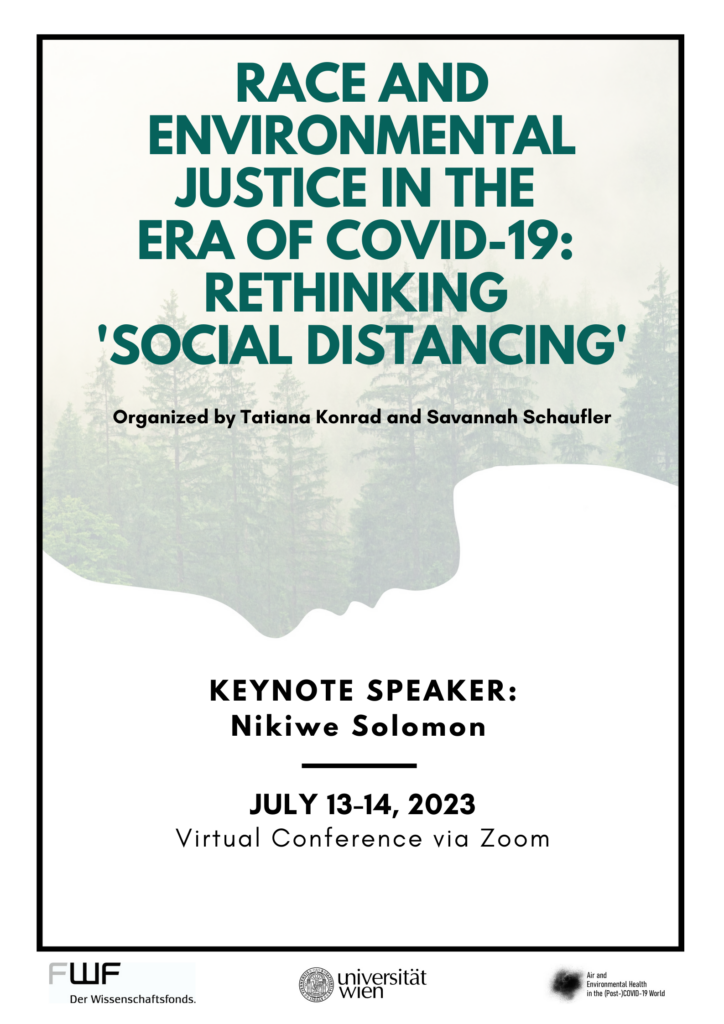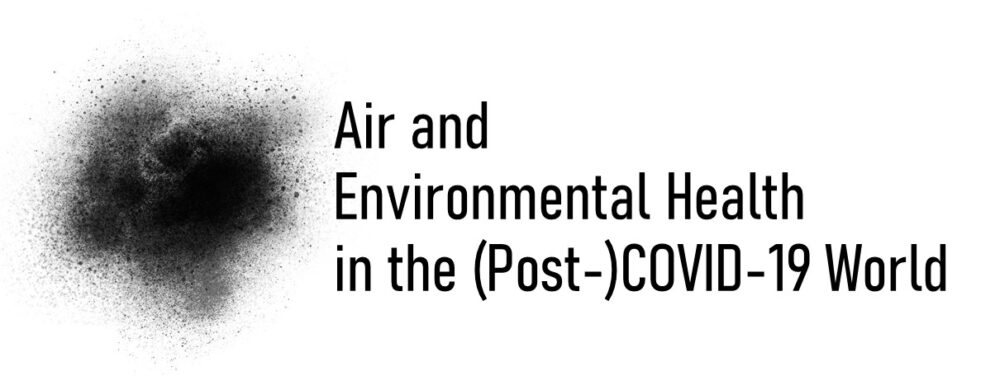Call for Papers (Deadline Extended)
Organized by Tatiana Konrad and Savannah Schaufler
University of Vienna
Conference Dates
Abstract Submission Deadline
Venue
Keynote Speaker
July 13-14, 2023
February 15, 2023
Virtual via Zoom
Nikiwe Solomon
(University of Cape Town)

Created via Canva
The virtual conference “Race and Environmental Justice in the Era of COVID-19: Rethinking ‘Social Distancing,’” organized as part of the Austrian Science Fund (FWF) project “Air and Environmental Health in the (Post-)COVID-19 World,” invites abstract submissions for consideration. This three-day online event will take place on July 13-14, 2023.
In light of the current pandemic, this conference examines the question of ‘social distancing’ at the intersection of environmental and critical race, Indigenous and ethnic studies. This conference addresses the ways in which the COVID-19 pandemic exacerbates structural issues at the heart of environmental justice, revealing racism as one of the central challenges for the contemporary period. This conference recognizes the ongoing dispossession, marginalization, and subjugation of BIPOC communities worldwide, alongside long histories of environmental stewardship, custodianship, care, protest, resistance, and organization, emerging and sustained by these communities. From this recognition comes the understanding of the myriad of consequences that emerge from structural white supremacy in the context of racial justice and environmental justice.
Positioning the COVID-19 pandemic as a public health issue, with deep roots in environmental degradation and disproportionate impacts on marginalized populations on local and global scales, is a significant context for contemporary research. Considering COVID-19 as an event that has amplified and illuminated ill-health in multiple, viral, and structural contexts, this conference attends to the interrelation of questions of environmental and racial justice as tied to power and control.
This conference positions ‘social distancing’ within an expanded framework, bringing necessary questions of intersectional justice to public health frameworks. Well-recognized are the disproportionate impacts of COVID-19 on BIPOC communities across the globe, exemplary of wider health disparities emerging from a number of societal and structural barriers to health care access and proximity to harms. We invite papers that consider the complexities of ‘social distancing’ and other public health practices in the context of race and environmental justice, particularly those grounded in place, or recognizing complex entanglements between communities, the state, and capitalist structures.1 Contributions might also address the ambiguity of ‘social distancing’—questioning structural isolation, broader societal barriers, and matters of proximity as they relate to environmental and racial (in)justice. In the context of structural racism and health, the impacts of “racial residential segregation”—the geographical distancing and separation of specific populations due to structural and endemic racism—is emphasized as directly correlated to disproportionate ill-health.2 We welcome contributions that critically engage with and reflect on the long and complex legacy of social and global (in)justice, calculated, political, and structural harm, and environmental (in)justice—generated by a variety of social, political, cultural, and economic factors—in the context of social distancing and COVID-19. In recognition of the interdisciplinary nature of this research, scholars working in multiple fields are encouraged to participate. However, a list of desirable topics is provided here to outline the scope of possible contributions:
- Environmental Health
- Environmental and Medical Racisms
- Intersectionality: Gender, Race, and Class
- Slow Violence, Toxicity, and Structural Harms
- Representation and Exclusion of BIPOC from Mainstream Environmental Narratives or Movements
- Settler Colonialism, Native Land Dispossession, and/or Resource Exploitation
- Protest, Resistance, Anti-Racist Activism
- Indigenous Cosmologies
- Labor, Wages, and Frontline Workers
- Black Liberation, Black Feminist Theory, and Abolition Ecologies
- Indigenous Environmental Justice
- Reconciliation, Land Rights, and Transformative Justice
- Indigenous Futurisms and Afrofuturism
- Environment, Values, Cultures, and Social Identities (including Disability, Indigeneity, Race, Queer Ecologies, and Ecofeminism)
- Anthropocene, Capitalocene, Chthulucene Refigurations
- Agriculture and Climate Justice
Please email your abstract of 300 words and short biographical statement of no more than 150 words by February 15, 2023, to air.anglistik@univie.ac.at
Conference proceedings will lead to some papers being included in a submission for an edited collection. We are currently in the process of negotiating this edited collection with potential publishers.
Click here to
download the CfP
This research was funded in whole, or in part, by the Austrian Science Fund (FWF) [10.55776/P34790].
1Sonja Avlijaš, “Security for Whom? Inequality and Human Dignity in Times of the Pandemic,” in Pandemics, Politics, and Society: Critical Perspectives on the Covid-19 Crisis, ed. Gerard Delanty (Berlin, Boston: De Gruyter, 2021), 227-42.
2 Dolores Acevedo-Garcia, “Residential Segregation and the Epidemiology of Infectious Diseases,” Social Science & Medicine 51, no. 8 (2000): 1143–61.

